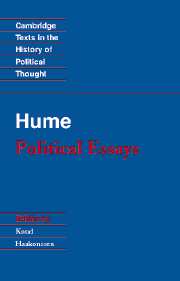Book contents
- Frontmatter
- Contents
- Acknowledgements
- Introduction
- Chronology
- Bibliographical notes
- A note on the text and the edition
- Biographical notes
- Bibliography
- Political Essays
- 1 Of the liberty of the press
- 2 That politics may be reduced to a science
- 3 Of the first principles of government
- 4 Of the origin of government
- 5 Of the independency of Parliament
- 6 Whether the British government inclines more to absolute monarchy, or to a republic
- 7 Of parties in general
- 8 Of the parties of Great Britain
- 9 Of superstition and enthusiasm
- 10 Of civil liberty
- 11 Of the rise and progress of the arts and sciences
- 12 Of national characters
- 13 Of commerce
- 14 Of refinement in the arts
- 15 Of money
- 16 Of interest
- 17 Of the balance of trade
- 18 Of the jealousy of trade
- 19 Of the balance of power
- 20 Of taxes
- 21 Of public credit
- 22 Of some remarkable customs
- 23 Of the original contract
- 24 Of passive obedience
- 25 Of the coalition of parties
- 26 Of the Protestant succession
- 27 Idea of a perfect commonwealth
- Appendix: Excerpts from Hume's History of England
- Notes
- Index
- Title in the Series
11 - Of the rise and progress of the arts and sciences
Published online by Cambridge University Press: 05 June 2012
- Frontmatter
- Contents
- Acknowledgements
- Introduction
- Chronology
- Bibliographical notes
- A note on the text and the edition
- Biographical notes
- Bibliography
- Political Essays
- 1 Of the liberty of the press
- 2 That politics may be reduced to a science
- 3 Of the first principles of government
- 4 Of the origin of government
- 5 Of the independency of Parliament
- 6 Whether the British government inclines more to absolute monarchy, or to a republic
- 7 Of parties in general
- 8 Of the parties of Great Britain
- 9 Of superstition and enthusiasm
- 10 Of civil liberty
- 11 Of the rise and progress of the arts and sciences
- 12 Of national characters
- 13 Of commerce
- 14 Of refinement in the arts
- 15 Of money
- 16 Of interest
- 17 Of the balance of trade
- 18 Of the jealousy of trade
- 19 Of the balance of power
- 20 Of taxes
- 21 Of public credit
- 22 Of some remarkable customs
- 23 Of the original contract
- 24 Of passive obedience
- 25 Of the coalition of parties
- 26 Of the Protestant succession
- 27 Idea of a perfect commonwealth
- Appendix: Excerpts from Hume's History of England
- Notes
- Index
- Title in the Series
Summary
Nothing requires greater nicety, in our enquiries concerning human affairs, than to distinguish exactly what is owing to chance, and what proceeds from causes; nor is there any subject, in which an author is more liable to deceive himself by false subtilties and refinements. To say, that any event is derived from chance, cuts short all farther enquiry concerning it, and leaves the writer in the same state of ignorance with the rest of mankind. But when the event is supposed to proceed from certain and stable causes, he may then display his ingenuity, in assigning these causes; and as a man of any subtilty can never be at a loss in this particular, he has thereby an opportunity of swelling his volumes, and discovering his profound knowledge, in observing what escapes the vulgar and ignorant.
The distinguishing between chance and causes must depend upon every particular man's sagacity, in considering every particular incident. But, if I were to assign any general rule to help us in applying this distinction, it would be the following, What depends upon a few persons is, in a great measure, to be ascribed to chance, or secret and unknown causes: What arises from a great number, may often be accounted for by determinate and known causes.
Two natural reasons may be assigned for this rule. First, If you suppose a dye to have any biass, however small, to a particular side, this biass, though, perhaps, it may not appear in a few throws, will certainly prevail in a great number, and will cast the balance entirely to that side.
- Type
- Chapter
- Information
- Hume: Political Essays , pp. 58 - 77Publisher: Cambridge University PressPrint publication year: 1994
- 7
- Cited by



